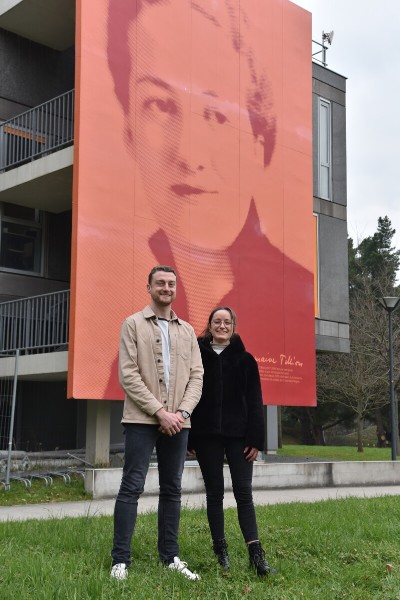Sport and cognitive stimulation to fight Huntington's disease
Since 2020, the Comon (cognition, motricity, digital) project aims to slow the progression of Huntington's disease through physical and cognitive exercises, and to evaluate the effects of the programme on the well-being and quality of life of patients. Linked to the Sam network of the Comue, it involves students and teacher/researchers from the Universities of Angers and Le Mans.

Julien Godard et Coline Chartier, étudiants à l'Université d'Angers et celle du Mans, sont pleinement intégrés dans le projet Comon.
Huntington's disease is a rare hereditary neurodegenerative disease of the nervous system that generally develops around the age of 40-50. It has motor consequences (balance or walking problems), cognitive consequences ( information processing speed, ability to manage two simultaneous tasks) and psychiatric consequences (irritability, lack of motivation). Several studies have shown that cognitive stimulation and physical activities could be beneficial in the absence of curative medical treatments.
In this sense, the Comon project has been launched from 2020 to June 2023 and has received €10,000 in funding from the Comue. It is headed by Philippe Allain, director of the Pays de la Loire psychology laboratory (LPPL) at the University of Angers, and Sylvain Durand, a teacher-researcher in physiology at the Motricity, Interactions and Performance laboratory (MIP) at Le Mans University. "This project has enabled the development of new interdisciplinary cooperation," emphasises Philippe Allain.
First trials take place in 2024
After the constitution of a team specialised in neurocognition, digital and staps (sciences and techniques of physical activities and sports), two students were also recruited as interns during their first year of their Master's degree two years ago: Coline Chartier (in neuro-psychology) at UA and Julien Godard (staps) at Le Mans University.
This interdisciplinary approach reinforces the interactions in the group and fosters concrete actions: development of cognitive and physical exercises, implementation of a specialized digital tool in partnership with Laris and the Userlab of the University of Angers and usable from the computer, developing a study protocol with an assessment of the effects...
"The initial tests conducted on healthy and elderly subjects have shown encouraging results," says the LPPL director. The first clinical trials will take place in 2024 and eventually, this programme will be possible to apply from the patients' homes."
In the meantime, Coline (at the LPPL) and Julien (at Laris and Mip) will continue their thesis work, financed by the Universities of Angers and Le Mans, the Angers University Hospital and Angers Loire Métropole, which they will complete in 2025. "It is an ambitious project that allows us to cross the views and skills of different fields with the aim of improving the health and quality of life of people who are ill," insists Julien. "It teaches us about interdisciplinary collaboration between researchers and about its importance in optimising the effectiveness and benefits of rehabilitation programmes," concludes Coline.
The Comon project team
In addition to Philippe Allain and Sylvain Durand, the Comon project also involves other teacher-researchers: Jérémy Besnard (lecturer in neuropsychology at UA), Emmanuelle Ménétrier (lecturer in cognitive psychology at UA), Paul Richard (HDR lecturer in virtual reality at UA), and Anne Heurtier (university professor in signal processing at UA).
